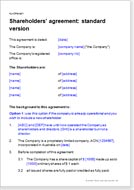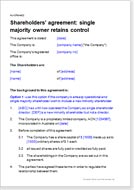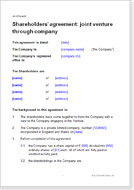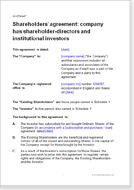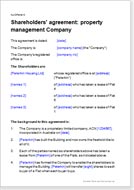Shareholders' agreements
Shareholders' agreements are a necessity for any company. Because they set out the rights of one shareholder against another, both majority and minority owners will want comprehensive agreements to protect their interests and investment in the company. These agreements do just that, covering a large range of matters, simply and logically.
Shareholders' agreement: standard version
- comprehensively covers issues that matter for founders and for investors
- can be used to re-balance the rights and obligations of minority shareholders
Shareholders' agreement: single majority owner retains control
An agreement for a company that is controlled by a single shareholder-director, probably the founder, who has the largest individual shareholding. Other minority owners retain all their statutory rights, but otherwise have no special protection.
Shareholders' agreement: joint venture through company
An agreement for a JV, operated through a company formed for that specific purpose.
The project that will be undertaken could be anything. Examples are: a property renovation, design and creation of a consumer product, or buying a company in order to sell the assets.
Because the company is likely to focus on achieving a single outcome, particular emphasis in placed on exit arrangements, including re-structuring.
Shareholders' agreement: professional investors
Includes the provisions that a large professional or institutional investor such as a business angel, venture capital or private equity investor would require to protect their investment.
It also considers the provisions of minority shareholders, who by virtue of the circumstances are likely to be the founders and friends and family of the founders.
Additional features to other documents include:
- drag along and tag along rights
- key man insurance
- rights of preference
- rights of first offer
- increased reporting requirements
Shareholders' agreement: property management company
An agreement where each shareholder is the owner of his or her own leasehold property within a building or scheme that is managed by the company.
It provides clear and practical routes through the contentious areas of who controls what, and leaves the owners with an arrangement that maximises efficient, democratic management of the communal areas of their property.

If the document isn’t right for your circumstances for any reason, just tell us and we’ll refund you in full immediately.

We avoid legal terminology unless necessary. Plain English makes our documents easy to understand, easy to edit and more likely to be accepted.

You don’t need legal knowledge to use our documents. We explain what to edit and how in the guidance notes included at the end of the document.

Email us with questions about editing your document. Use our Lawyer Assist service if you’d like our legal team to check your document will do as you intend.

Our documents comply with the latest relevant law. Our lawyers regularly review how new law affects each document in our library.
What is a shareholders agreement?
A shareholders agreement is a legally binding, private document that sets out further powers, rights and obligations that the owners have to each other and the company, beyond those that already exist under law or through the constitution of the company.
The Corporations Act 2001 provides the over-arching rules under which all companies must operate including the rights and responsibilities of shareholders.
The company constitution sets out how an individual company is run by the board of directors and the shareholders. This document records how the owners control and manage the business between themselves, providing the basic business structure. Many of the matters covered are procedures, such as how meetings are called, or how an offer to buy shares should be made.
Further to that joint framework of the Corporations Act 2001 and a company's constitution, using a shareholders agreement, there is enormous scope to decide who may do what, and under what circumstances.
Why do I need a shareholders agreement with other owners?
Having a shareholders agreement in place is essential for both majority and minority owners.
The reason why to write one is not one of compliance with the law, but for the protection of your personal interests - even if you are a majority shareholder who owns more than half of the total share capital.
Minority shareholders are likely to want greater control over the decisions that influence the value of their holding than the law gives them by default.
A majority shareholder may wish to make sure that minority shareholders cannot sell their shares easily to anyone who may have different ideas about the direction the company should take, or that a previous employee who left the company as a result of poor behaviour (commonly known as a bad leaver) has no say in decisions.
What should a shareholders agreement cover?
A shareholders agreement deals with issues of control:
- how decisions are made
- who has certain additional rights to those under statute law
- how shares are issued to incoming shareholders
- shareholders' duties and entitlements
- shareholders' rights to information and dividends
- what happens when a shareholder wants sells his or her shares, or an offer is made for shares
Every agreement will balance different shareholder interests differently, including:
- protecting minority owners who otherwise do not have a great influence on decisions
- protecting a founder entrepreneur or lender who has a small shareholding but a large interest in the company
- setting out who can be a board member and therefore influence decisions taken by the directors that are not put to the all the shareholders
- controlling the appointment and termination of directors
- providing options for exit provisions whether the shareholder is leaving the company on good or bad terms
The type of business you carry out is less important than the contents of the document.
It is very easy to add industry-specific provisions to your agreement, but they still tend to boil down to questions of power or policy.
Although you can include strategy and objectives, it is a mistake to fill your shareholder agreement with matters that should best be covered in your business plan - a level even lower down the structure.
Specific matters covered in all our templates
The following tend to be commonly included in a shareholders' agreement.
Clarification of decision making
Executive directors are employees, accountable to the company and its shareholders. Where directors are also stock holders, as is so often the case, a director may be able to make decisions that benefit himself as a shareholder, but which are not in the interests of his fellow owners.
A shareholders agreement fulfils the role of an operating agreement. It allows you to set the limits of director power, and clarify what matters should be referred to the share holders for a decision. Doing so helps to ensure that owners are kept informed and that the most important decisions are made by them as a group, and not by the directors.
For example, your corporation may have a particularly charismatic president of the board, who although being a minority shareholder has great influence over the directors and who has a tendency to force through decisions on important issues.
The converse applies too. An agreement can also define what decisions a shareholder-director may take freely or with prior written approval, without requiring a members meeting, allowing confident, decisive action when it is needed. This may help incentivise a chief executive officer who might otherwise feel constrained in taking measured risks.
An agreement can also help resolve deadlock in decision making between the owners as shareholders. Without such provisions, it is possible that a situation that is not beneficial for the company or any owner continues indefinitely.
Rebalance shareholder power on issues that are important to you
By default, voting power is in proportion to shares held. Your agreement can over-ride this basis, allowing you to specify the rules as to how decisions on subjects important to you are made. Minority shareholders can be given more say on certain issues.
For example, you might give every shareholder an equal vote on decisions relating to the appointment of directors regardless of proportionate ownership. In some circumstances, you might decide that each shareholder may be a director or appoint some other person to be a director. Another burning issue could be a sale to a third party.
Decisions on different subjects could be decided in different ways depending on the importance of each subject to each shareholder. You can go as far as to completely separate ownership and control: useful if some shareholders may not have experience or knowledge of running the company to allow them to make effective decisions. For family businesses and companies where some shareholders hold shares only as an investment, this ability to separate ownership from governance is likely to be a useful feature.
Protect the value of your investment
Having a written shareholders agreement in place can help prevent other owners from reducing the value of your investment by their actions. It can do this by setting out:
- requirements for disclosure and for approval for certain actions such as large asset purchases
- who makes financing decisions, such as borrowing from a third party which impact preference on a shareholder loan to the company
- how issues of new shares are approved
- how assets, time, and expertise brought into the business should be valued on sale
- rights of refusal existing shareholders have over other prospective buyers when shares are offered for sale
- what happens when one of the shareholders is dismissed for poor behaviour (known as a bad leaver)
Guard your privacy relating to management of the company
Some aspects of management can be set out in the company's constitution. However, unlike the constitution, your shareholders' agreement is a private document that you don't have to file with ASIC or make publicly available.
Only you and other owners will know the arrangements you have. How your company is managed therefore remains confidential.
Reduce the likelihood and cost of disputes
Disputes between owners and other stakeholders are expensive and can be disruptive and detrimental to the on-going operation of the business.
Many matters are likely to be discussed at each annual general meeting of the members. Some will require immediate action and therefore will be voted on. Others will come under strategic or contingency planning, such as under what circumstances owners agree to a merger if approached.
The likelihood is that over a period of time, consensus might be forgotten on any single issue if it wasn't something that required a vote.
Discussing these matters at the outset when starting a new business or when a new shareholder arrives and then recording them in writing limits the scope for a single member to scupper the plans of the other stockholders by claiming that he or she has never been involved in such decisions.
In other words, having a shareholders agreement written in plain English means that shareholders are less likely to dispute what was agreed upon when the document was signed.
Thought in advance about what subjects might be sensitive, and therefore likely to create disagreement helps avoid future disputes.
The inclusion of a dispute resolution procedure (which could be arbitration or mediation) within each shareholder agreement template makes resolving any that do occur easier.
Retain control in difficult situations
A shareholders agreement allows you to plan for the worst so as to keep the business operations going. Within it, you can set out what would happen should certain events occur, whether the sudden departure of a key founder or the withdrawal of a source of funding.
Writing one, together with the other owners, is a process that allows you collectively to evaluate the risks to each of you. It can help with business planning, especially for a new business.
Practical matters covered
Format and layout
Like all Net Lawman documents, our shareholder agreement templates are in Microsoft Word format. The main advantage of a Word document is that you are not restricted in what you can edit - you really can create an agreement that fits your business. Of course, as your business grows, you can also revisit the document and amend it as necessary. Features within Word such as Track Changes allow you to collaborate with other owners easily.
The law in these shareholders agreements
The law relating to these documents is both corporate law (principally the Corporations Act 2001) and commercial contract law.
Our guidance notes make it clear which paragraphs you can safely edit or delete, and which we recommend leaving as drawn.
However, your shareholders' agreement is always subject to constitution of your company. If you are putting one in place, it is usually a good time also to review and update your company's constitution to make sure that there are no conflicts between the two documents.
Templates in plain English
Our templates are written in plain English by a solicitor who specialises in commercial drafting and who has practical experience in resolving shareholder disputes.
As a former director of numerous private and publicly listed companies, he includes practical, real world considerations. These agreements are comprehensive in the cover of legal and management issues.
Special provisions covered in our shareholders' agreements
Vesting provisions
For various reasons, many start-ups want vesting provisions. That is, a shareholder can cash out his or her equity only after an agreed period has passed, or when his or her performance is satisfactory or when a certain event occurs.
In the US, the terms under which vesting will happen are usually placed in the shareholders' agreement. At Net Lawman, we believe that for technical legal reasons, it is better to place them in other documents.
We recommend either:
- that your company constitution allow for multiple classes of share, one of which has limited or no rights until an event passes on which the class becomes convertible to a class of share that has full rights, or
- that you incentivise individual employees or third party contractors using a share option agreement that links the ability to buy shares at a preferential price to that individual's performance in some way (such as length of tenure in the company, or achievement of a milestone for which he or she is involved in reaching).
How shares are valued
Agreeing on a methodology for the valuation of private shares is important and can be done within the agreement.
A shareholder may wish to exit the business or sell their shares in the company (or just some of their shareholding) to generate cash.
Or you might be making a new issue of shares.
Share valuation methodology is often important for dispute resolution - an otherwise unresolvable dispute may be most easily solved by a shareholder buying out another.
While share prices for public companies can easily be estimated from recent trades on the stock market, those for private companies are more difficult to ascertain, particularly if the company is a relatively new business.
For a smaller company, you could use Generally Accepted Accounting Principles ('GAAP') as the basis for a valuation at fair market value ('FMV'), but the actual price that a buyer would be willing to pay might be very different depending on the shareholder rights attached to those shares, or the rights that other shareholders have.
All these shareholder agreement templates include provision for valuation of the shares of a departing shareholder by reference to a valuation based on your instructions to an accountant. The valuation depends on the parameters used, so your instructions are critical.
We have provided comprehensive wording that you can edit according to the deal you wish to strike with a selling shareholder.
Tag along, drag along, and right of first refusal
These provisions are included in our shareholders' agreement for an institutional investor because it is in that situation where they are most sought after, but the presence of an institutional investor is not a pre-requisite for using them.
Tag along and drag along provisions are essential if you anticipate a sell-out to which not all shareholders might agree.
They provide that:
- no shareholder can sell a majority shareholding unless the same deal is also offered to the minority shareholder.
- if the majority shareholder wants to sell their shares and the buyer has offered the same deal to the minority shareholder, the minority shareholder must accept and sell.
Right of first refusal can help protect from an unwanted outsider buying into the business if one of the other shareholders decides to sell.
A professional investor will nearly always require these provisions so that his exit route is clear.
Choice of limited company
The limited liability that an incorporated business structure affords is an enormous advantage for startups, a small business, or a nonprofit over a general partnership or sole proprietorship because as its own legal entity, it reduces personal liability for losses.
However, limited liability should not be confused with removing responsibility or obligation entirely. Directors have specific responsibilities under corporate law.
What are reserved matters?
Reserved matters are decisions regarding the management of the company that can only be made having obtained consent from a special majority (shareholders who hold more than 75% of the voting shares, or possibly unanimity).
For example, reserved matters might include:
- changes to the company's constitution
- changes to the nature and scope of the business or a key segment
- borrowing or lending sums greater than a certain amount
- declaration and payment of additional dividends
Oliver Sellars (LLB) external London
The price was fair and reasonable for the product and is a great cost effective start for people wanting to set up in business and have some rules around that business in place prior to success or failure!
I will be using Net Lawman again.
All rights reserved

